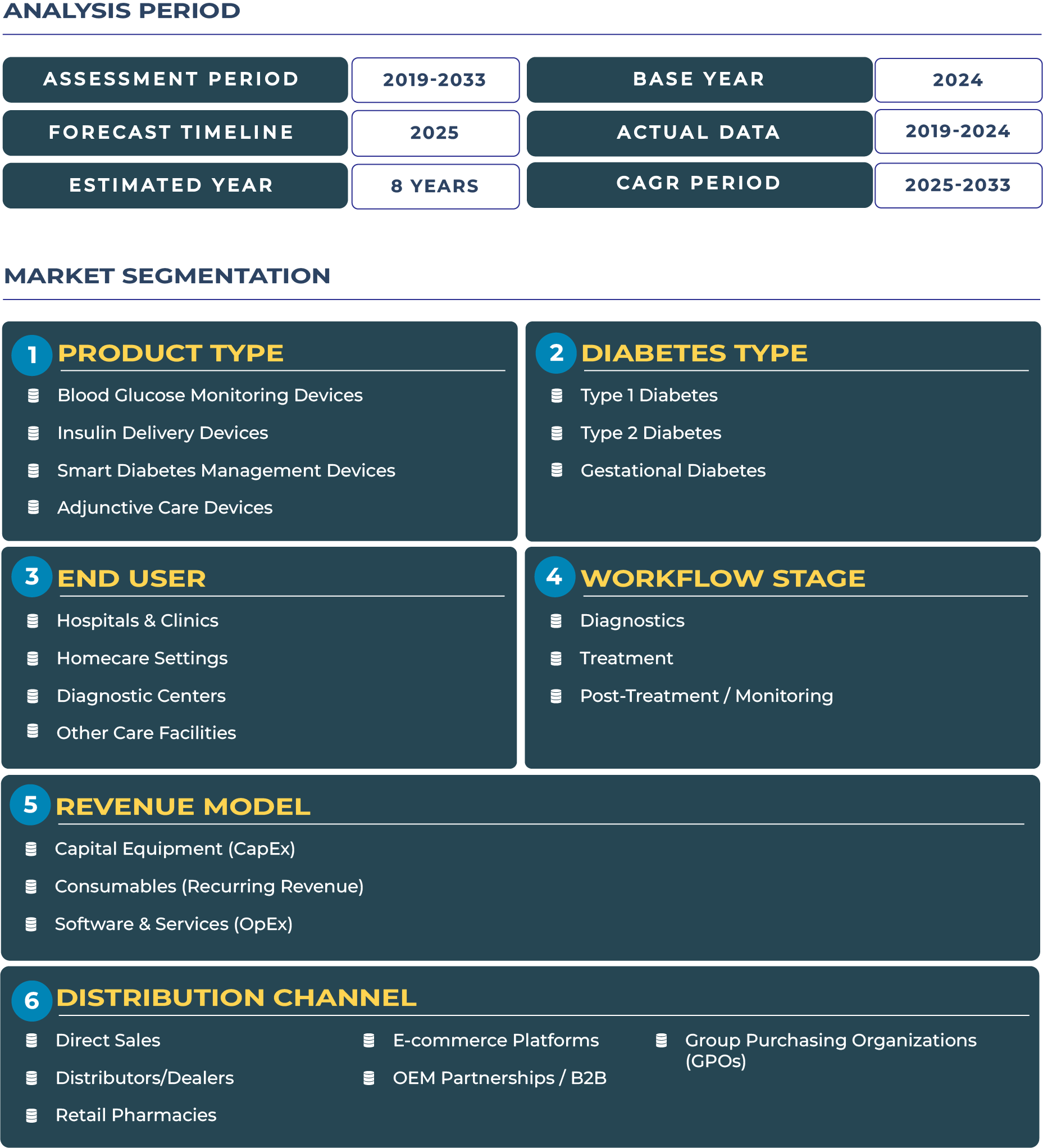Bahrain Diabetes Care Devices Market Outlook: Expat-Driven Private Demand Creates Strong Foundations for Growth in Bahrain Diabetes Care Devices Sector
The Bahrain diabetes care devices market is increasingly shaped by a direct-to-consumer (D2C) and private hospital strategy, reflecting the unique demographic profile of the country. With expatriates comprising the majority of Bahrain’s working population, distribution channels that emphasize private hospitals, retail pharmacies, and telehealth consultations have become crucial to device adoption. Unlike larger GCC neighbors where public procurement dominates, Bahrain offers a fertile environment for device manufacturers to reach high-value patients directly. This model enables companies to introduce continuous glucose monitoring (CGM) devices, insulin pumps, and connected diabetes management solutions with greater agility. The Ministry of Health Bahrain provides regulatory oversight, but much of the traction for advanced devices is seen in the expat-heavy private healthcare ecosystem, where affordability and convenience drive consumer behavior.
The Bahrain diabetes care devices market is forecasted to grow from USD 9.0 million in 2025 to USD 14.3 million by 2033, expanding at a steady CAGR of 5.9% during 2025–2033. This growth trajectory is underpinned by strong private healthcare expenditure and an expatriate population that often seeks premium medical solutions outside the public system. High average selling prices (ASP) for continuous glucose monitoring devices and insulin delivery systems are achievable in this environment, supported by Bahrain’s reputation as a medical hub within the GCC. Furthermore, the country’s stable financial environment and rising health consciousness have increased demand for smart diabetes management devices that align with telemedicine platforms. Political and economic stability within Bahrain also provides a favorable setting for consistent device imports and adoption, with minimal disruption from regional tensions compared to neighboring economies.
Drivers & Restraints: High-Value Niche Market Meets the Challenge of Small Volumes in Bahrain diabetes care devices Industry
One of the most compelling drivers in Bahrain diabetes care devices landscape is its profile as a small but high-ASP market. Per capita healthcare spending is strong, and private hospitals are actively investing in smart diabetes management devices to differentiate their service offerings. Expatriate patients in particular are willing to pay a premium for reliable glucose monitoring systems and advanced insulin pumps that offer convenience and integration with telehealth consultations. This positioning gives Bahrain an outsized influence relative to its market size, with hospitals in Manama and Muharraq acting as early adopters of innovative diabetes care technologies. Combined with the government’s preventive healthcare strategies, these dynamics sustain momentum in the sector.
On the other hand, Bahrain diabetes care devices sector faces structural restraints tied to its small population and reliance on GCC-wide import and distribution networks. Market volume remains limited, which restricts economies of scale for suppliers. Additionally, dependence on regional supply flows through Saudi Arabia and the UAE can expose Bahrain to procurement delays and pricing pressures during times of regional instability. Regulatory frameworks add another layer of complexity, as device affordability is often impacted by import costs and taxation. These constraints make market penetration slower for newer technologies unless supported by private insurance schemes or hospital partnerships.
Trends & Opportunities: Telehealth Expansion and Private Hospital Adoption Fueling the Future of Bahrain Diabetes Care Devices Market
Among the most notable trends in Bahrain diabetes care devices sector is the rise of telehealth platforms catering to the expatriate population. Continuous glucose monitoring devices and smart insulin pens that integrate seamlessly with mobile health applications are gaining popularity, as they provide convenience and continuity of care for patients who frequently travel between Bahrain and their home countries. Telehealth adoption has accelerated since the COVID-19 pandemic and is now being integrated into Bahrain’s private healthcare ecosystem, giving device manufacturers opportunities to bundle products with virtual consultation packages.
Another significant opportunity lies in private hospital adoption rates for advanced diabetes care devices. Leading hospitals in Manama are increasingly sourcing insulin delivery devices and smart diabetes management solutions to enhance their specialty endocrinology services. This trend is creating space for suppliers to form strategic partnerships that ensure regular device procurement and in-hospital training programs. With the competitive private sector seeking differentiation, companies that can align their offerings with premium patient experiences will be well-positioned for long-term growth in Bahrain diabetes care devices industry.
Competitive Landscape: Expat-Centric Strategies and Hospital Partnerships Reshaping Bahrain Diabetes Care Devices Ecosystem
The competitive dynamics of Bahrain diabetes care devices landscape reveal a strong presence of global leaders alongside local distributors. Companies such as Roche, Medtronic, and Abbott are actively engaged in the market, with their products being widely adopted across Bahrain’s private hospitals and specialty clinics. In 2024, several partnerships between private hospitals in Manama and international suppliers enabled the rollout of insulin delivery systems supported by training modules for healthcare professionals. Expat-focused D2C strategies are also gaining traction, with global companies introducing online ordering platforms and subscription models that directly target high-income patient groups.
Local distributors continue to play a pivotal role by navigating Bahrain’s regulatory environment and ensuring last-mile servicing of devices. The sector’s competitive strategy increasingly revolves around capturing the expat premium market, where convenience, speed of access, and bundled telehealth integration drive purchasing decisions. Companies that adapt to Bahrain’s expat-driven healthcare model, with a strong emphasis on private hospital partnerships and digital-first logistics, are positioned to gain sustainable advantages.







